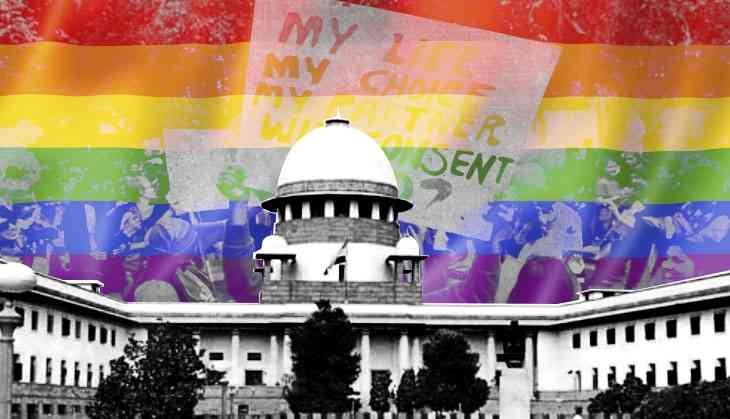Section 377: Will SC scrap the criminalisation of homosexuality?

The Supreme Court on Tuesday began hearing a clutch of petitions seeking scrapping of Section 377 of the Indian Penal Code (IPC) which criminalises homosexuality in the country. The petitioners, also comprising members of LGBT community, contend that “right to sexuality” and “right to choice of a sexual partner” are fundamental rights protected under Article 21 of the Constitution.
The five-judge Constitution Bench headed by Chief Justice of India Dipak Misra heard at length the petitioners’ counsels who argued that the ambit of hearing be not just restricted to decriminalisation of homosexuality, but should extend to declaring that rights of the LGBT community are covered under Article 21.
Appearing for the petitioners, senior counsel Mukul Rohatgi argued for scrapping of Section 377 which criminalises homosexuality and punishes “carnal intercourse against the order of nature with any man, woman or animal”, with imprisonment for life, or with imprisonment for a term extending to ten years.
'Victorian era moral irrelevant in 21st century'
Rohatgi argued that Victorian era law was irrelevant today.
“Section 377 is based on the Victorian morals of 1860 as against the position in ancient India which is indicated by the existence of a character like Shikhandi in the Mahabharata and the depictions in the Khajuraho temples.
“What is the order of nature in 1860 can't be the order of nature today. Whether a pre-constitutional law not framed by our Parliament and which does not recognise the needs of our people should remain in existence,” asked Rohatgi.
He also questioned the judgment in the Suresh Kumar Kaushal vs Naz Foundation case in which the Supreme Court had upheld the constitutional validity of Section 377 after the Delhi High Court had decriminalised homosexuality.
“The Kaushal case judgment affects the basic rights of a section of people and it has an impact on the society,” argued Rohatgi.
Brief timeline
The Delhi High Court, in July 2009 in “Naz Foundation vs Govt. of NCT of Delhi, had decriminalised consensual same-sex sexual relations between adults, holding that the provision “grossly violates homosexual individuals’ right to privacy and liberty embodied in Article 21”.
It had ruled that Section 377 violated Articles 14, 15 and 21 of the Constitution.
While the Centre did not challenge the verdict, a host of petitions were filed in the apex court opposing the High Court judgment.
Subsequently in December 2013, an Apex Court bench in the Kaushal case, reversed the High Court verdict and upheld the constitutional validity of Section 377.
Later in June 2016 five LGBT community members-- Bharatnatyam exponent Navtej Singh Johar, journalist Sunil Mehra, chef, Ritu Dalmia, businesswoman Ayesha Kapur and hotelier Aman Nath filed a petition challenging section 377. They also contended that a larger constitution bench be formed to hear all petitions on the issue.
In January this year a bench headed by Chief Justice of India (CJI) Dipak Misra referred the petitions challenging the legality of Section 377 to the present Constitution Bench while observing that the apex court judgment, in the Kaushal v Naz Foundation case upholding the constitutionality of Section 377, required to be “reexamined”.
The Constitution Bench that began hearing the clutch of six petitions on Tuesday, besides CJI Misra, comprises Justices AM Khanwilkar, DY Chandrachud, RF Nariman and Indu Malhotra.
The bench on Monday had rejected the Centre’s plea to defer the hearing. The Centre had sought more time to file its response.
Appearing for the Centre, Additional Solicitor General Tushar Mehta on Tuesday pleaded that the petitioners should restrict their arguments only to constitutional validity of Section 377. He pleaded the court for more time to file the Centre’s reply if the arguments were beyond Section 377.
Contention by the petitioners
The petitioners contend that their rights to sexuality, sexual autonomy, choice of sexual partner, life, privacy, dignity and equality, along with the other fundamental rights guaranteed by the Constitution, were infringed by Section 377.
They have also argued that right to sexuality and the right to choice of a sexual partner are fundamental rights protected under Article 21 of the Constitution and have questioned whether section 377 is unconstitutional and violative of the Constitution and hence be struck down.
As per the petitioners, the continuance of Section 377 ensures that the Constitutional guarantees of equality, fraternity, dignity, life and liberty, are not extended to them.
“Section 377 criminalises a core part of a person’s identity solely on account of his or her sexuality. It denies LGBT persons, their right to full personhood, sexuality, sexual autonomy, and choice of sexual partner, which are implicit in the notion of life under Article 21 of the Constitution.
Section 377 criminalises the very existence of LGBT persons by criminalising their sexuality, an attribute which is as inherent and intrinsic to a person as their race or gender. The law recognizes petitioners only as criminals and reduces their love to a crime,” states the petition.
The petitioners have further stated they are unable to form professional associations with other similarly placed persons to voice their concerns about discrimination which they may face in places of employment, education, or otherwise.
“The Petitioners cannot overcome a lurking fear that their consensual relationships, even within the privacy of their homes, may invite coercive state action at the hands of a busybody, rival, political party, or any other 3rd party who has no bona fide interest with the private lives of the Petitioners, and is motivated only by malice/prejudice,” stated the petition.
The hearing will resume on Wednesday.
First published: 10 July 2018, 19:20 IST





![BJP's Kapil Mishra recreates Shankar Mahadevan’s ‘Breathless’ song to highlight Delhi pollution [WATCH] BJP's Kapil Mishra recreates Shankar Mahadevan’s ‘Breathless’ song to highlight Delhi pollution [WATCH]](https://images.catchnews.com/upload/2022/11/03/kapil-mishra_240884_300x172.png)

![Anupam Kher shares pictures of his toned body on 67th birthday [MUST SEE] Anupam Kher shares pictures of his toned body on 67th birthday [MUST SEE]](https://images.catchnews.com/upload/2022/03/07/Anupam_kher_231145_300x172.jpg)






